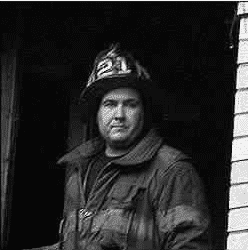February 26, 2020
For Mike Wells, a member of Prince George’s County, MD Local 1619, the fire service is like family. After his brothers and sisters struggled with a season of loss, Wells’ work as a peer support leader helped strengthen bonds in the firehouse and beyond. As an IAFF peer support instructor, Wells has also trained training IAFF affiliates throughout the United States and Canada.

In 2016, Prince George’s County Local 1619 experienced a series of tragic losses, including the passing of fire fighter John “Skillet” Ulmschnider during a routine welfare check, a member’s occupational cancer diagnosis, a retiree’s passing in a car accident and a member suicide.
Rocked by these events, Prince George’s county fire fighters needed additional outlets to cope. One of the first steps toward healing was to build a peer support program to encourage members to open up in ways that lifted the burdens of guilt, shame, and doubt.
Supported by the department’s employee assistance program (EAP), the Prince George’s County peer support program provides camaraderie and a wealth of resources to help members who may be struggling with family, work-life balance, mental health, addiction or overcoming a tough call without fear of repercussions or stigma associated with asking for help.
“It’s been really exciting to see the impact of peer support throughout our district,” says 4thh District Vice President Andy Pantelis. “For a brother or sister who is struggling, knowing they can reach out to someone who has walked in their boots makes a difference. It can be the difference between getting help or struggling in silence.”
As a leader, mentor and peer support trainer, Wells knows that there is a fine line between connecting and obstructing. “We didn’t want to be overwhelming or overbearing,” he says. “The message can get lost in translation. We needed to slowly introduce the program and be a friendly service.”
In his role as a peer supporter, Wells performs regular outreach to ensure members know about the services offered. Although most peer support connections happen over the phone, educating members about the program often happens in person before a major event occurs.
When a member reaches out for help, Wells explains that the foundation of peer support includes ensuring that the member’s basic needs are met and understanding how they are coping. When a member calls, it’s because they know there is something off, so identifying that early on can help peer supporters provide the best assistance.
Whether members are struggling with a sick child at home, dealing with loss or struggling after a challenging call, peer support team members are trained in active listening, assessment, crisis intervention and providing local referrals to services as needed. Depending on the situation, peer supporters may recommend local counselors, medical professionals, support groups, treatment programs or to meet regularly one-on-one.
Members also have access to a free Google voice line that Wells and his team established. The confidential line masks the incoming phone number and provides a confidential way for fire fighters to reach out. This innovative approach offers additional benefits to fire fighters who may struggle due to fear or stigma.
Prince George’s County Local 1619 currently has more than 30 peer support team members, all with varying experiences that allow them to relate to others.
Since the peer support program began in 2016, Wells has noticed healing within his local and beyond. Members are talking about mental health more and noticing changes in their coworkers. Instead of minimizing feelings and experiences, open dialogue helps members deal with stress and emotions in a proactive way. Wells explains, “The stigmas are being chipped away, little by little.”
By genuinely caring for each member, Wells and the peer support team continue to inspire action and spark positive changes.
For members struggling with substance abuse or other mental health conditions, the IAFF Center of Excellence for Behavioral Health Treatment and Recovery can help. It is a first-of-its-kind treatment facility exclusively for IAFF members. Located in Upper Marlboro, Maryland, the Center of Excellence provides a continuum of care for a variety of conditions. If you or someone you know may benefit from treatment, call today to speak with a representative or contact your peer support team to learn more.